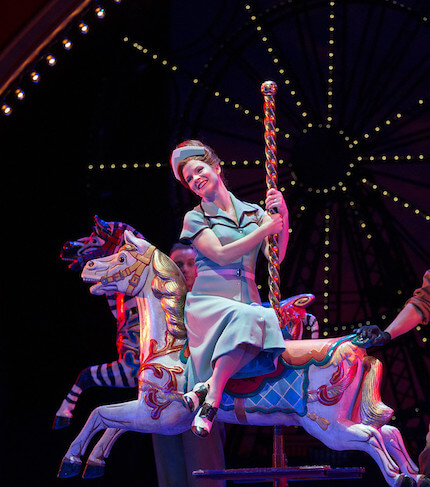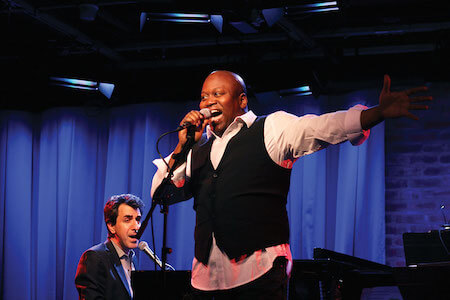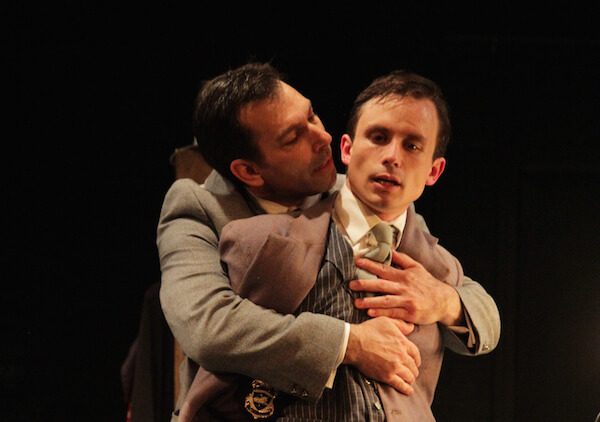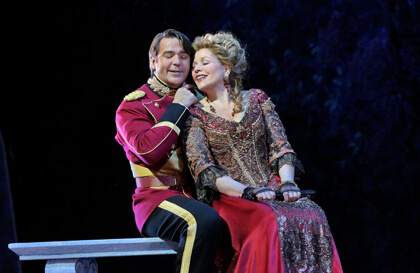BY DAVID NOH | You can see a new star exploding at Lincoln Center these days in the revival of “The King and I,” in the title role-personage of Hoon Lee, an actor I’ve admired for years who has now fully come into his own. Possessing the real majesty, histrionic prowess, vocal chops, devastating sexiness, and, pointedly, English language proficiency — all of which his predecessor, Ken Watanabe, so direly lacked — this actor has truly transformed the show into an absolute must-see.
The chemistry between Lee and co-star Kelli O’Hara is one of the current treasures of the season, and everyone and everything on this stage now positively sparkles, as if reflecting his glory (Vivian Beaumont Theater, 150 W. 65th St.; telecharge.com).
The man has the charisma and talent to cross over in a way that few people of color — Brian Stokes Mitchell, to name one — have been both able and allowed to do. I’d love to see him take a crack at Horace Vandergelder in the announced Bette Midler “Hello, Dolly!” remounting!
Korean actor Hoon Lee magnificently makes a Rodgers & Hammerstein character his own
Describing how he landed the role, Lee told me, “Honestly, I was filming [his Cinemax TV series] ‘Banshee’ in Pittsburgh and just got a call about being a replacement, saying that Ken Watanabe was leaving the show. Scheduling was tight, so I came into New York, saw the show in its entirety for the first time ever — [laughs] at the very least, I thought I would get a free show out of it — and had a work session the next day. It was an opportunity to meet and work with people at the top of their game. Things went fairly swiftly after that and it was an amazing thing to come to this after completing the last season of ‘Banshee.’ The two shows are so different, in terms of the work and what muscles get exercised and what is demanded of you. That was a challenge I was looking forward to.”
Lee, who really surprised me — my being more familiar with his dramatic work than his powerful, deft singing voice — grew up in the Boston area, the son of two molecular biologists, and went to Harvard, where he majored in visual art and English lit.
“I actually started acting through musical theater. I had been a singer in college in bands, but acting wasn’t really on the radar at all, then. While I haven’t sung in a long time in a serious way, I felt like I would have enough for this role of the King, which isn’t all that intense singing-wise, and it’s been nice to start to feel out the corners of that again. I’ve never had any formal training, but I grew up listening to my father, who was a great singer, but only as a hobby. As a boy, I remember hearing him sing and as I got older, I realized he was actually quite good, but my whole family grew up with musicality. I’ve always enjoyed singing, but never took myself seriously.
“I fell into acting through my friend Woody Pak, who had composed the score to a musical, ‘Making Tracks,’ which was going to tour Taiwan. I had helped record a concept album to promote it. They didn’t have a cast, so, based on that, the producers of the show asked me to audition. I was then working as the artistic director for a web development company, a very difficult time. I suffered from bad health issues from the stress of that job and looked at this as an opportunity to take a break and recalibrate.
“I got the role and did it for three months. When I came back to my company, I realized I felt healthier than I did in a long time. So I gave notice, gathered my portfolio together, and started to freelance. The choreographer of ‘Making Tracks’ was Marc Oka, who’s also in ‘The King and I.’ He told me about a Paper Mill Playhouse production of ‘King and I,’ and I auditioned and got the role of Kralahome.
“While that was going on, ‘Flower Drum Song’ was coming to New York from LA, and Marc again championed me. I got the role of Chao, which they were reimagining for that revival, and that was my first calendar year of acting. I was fortunate enough to roll from one project to another, so it became clear that maybe this is what I should be doing, as long as the luck holds out [chuckles].”
Lee was prominently featured in David Henry Hwang’s “Yellowface” at the Public Theater, and his strong performance made me wonder if that was sort of a game-changer in his career.
“It was a wonderful piece and team. It’s a cliché, but I feel that what the so-called overnight success really speaks to is the idea that any sort of recognition is an aggregate of smaller advances. What that show really did was put me in the position of doing my first lead, and that’s not an opportunity many people — let alone Asian men — get a lot. It was a good test for myself, an incredible opportunity to do such a complex, nuanced, and funny piece of writing, and to work at the Public under the amazing direction of Leigh Silverman.”
I mentioned that Lee must surely be aware of the excited buzz about him now in “The King and I.”
“I don’t put much stock in it. Fortunately or unfortunately, depending upon your perspective, this is the kind of business where you’re only as good as your last two jobs. There could be another great opportunity after this or a fall-off, but that’s okay. It’s actually more helpful to me to keep my mind at the task at hand and try to execute it. That’s really the part of theater that I find very difficult but also very satisfying, trying to get yourself to the place where you really dig in every night and develop the necessary stamina, muscles, and ingenuity. You try to give yourself enough of a mental puzzle to solve so that you can really hook in every night. Some days you succeed or don’t, and that’s always the challenge before you.”
We were sitting in Hoon’s dressing room, which, due to the temporary status of his replacement reign as the King, was largely bare of souvenirs or personal touches, save his royal Catherine Zuber-designed raiment hanging there. I appreciated him giving me an interview just before the evening performance and wondered if vocal rest was ever necessary, especially in light of the ferocious kingly yelling he does at one point, while cracking a bullwhip, which really terrified the Sunday matinee audience I was a part of.
He demurred.
“The musical form by its nature is a heightened form where the emotion of a scene is carried by music. That exists outside the boundaries of normal everyday expectations, so it doesn’t really serve anything to willfully underplay things that need to be pushed in the other direction. Kelli has the lion’s share of the lifting here and has to carry so much of the emotion through song, which she does so incredibly beautifully. For the King, it’s more in the acting and I have to find the power, fear, and uncertainty and match her emotion and energy in the ways that I’m allowed to do it. Yes, I had to take bullwhip lessons, and it’s a terrifying thing to hold, like a gun, as you realize you have something in your hand that’s designed to destroy.
“Kelli’s a dream to work with. In any sort of collaborative creative effort, your performance is shaped by those around you, and if people are responding positively to my King it’s because I have such an incredible partner to bolster me, reflect what I am doing, and set the bar even higher to give me something to shoot for. She’s had a tough task, which she’s dealt with very gracefully, having to contend with multiple people coming in to partner her. There are parts of the show which are really like two-handers, so for her to have the deftness and facility to partner so well with myself, Jose [Llana], and Ken speaks largely to her abilities and work ethic.”
The subtle romantic attraction between the King and Anna has always been one of this show’s major secret weapons, and the chemistry between Lee and O’Hara is thrillingly palpable yet, deliciously, never overstated.
“We’ve been getting that comment since we started, which is wonderful for the show, but such a mystery as to why it happens. We only had one meal together and one rehearsal, and then we started before an audience. I think both of us approached this with open hearts and minds, and again it’s more of a credit to her because she really put in her time after hundreds of performance. It would have been understandable for her to say, ‘This is my show, this is what works.’ But she didn’t approach it that way at all: she was very generous and if people are reading chemistry here, I tend to think it’s because we’re both really trying to work and listen to and find each other onstage. I’m just glad people are able to key into that, especially in an R&H [Rodgers & Hammerstein] show, because in an R&H show like this, which has such structural integrity that it almost runs itself, that energy flow can really bring things to a different level that really resonates with people.”
It’s very easy to make the King a cartoonish, bald-pated figure, as exemplified by the brilliant Phil Hartman “Saturday Night Live” skit, in which he played a venerable but still strutting Yul Brynner doing his 3,000th tour of the role, so I wanted to know how Lee himself saw the character.
“I had the benefit of never seeing Brynner in the movie, as it’s good not to get these things stuck in my head. When an actor has put his stamp on a role as indelibly as he did, that’s a big warning sign if you’re going to try and tackle it. With any role, I run to the script and try to find any clues given to me. This book is great because it’s deceptive in the seamlessness of the writing, which is simple, but not simplistic, with the efficiency and grace of a writer who had a really refined sensibility. And the adjustments they’ve made to the published version of this production were tremendously helpful to me.
“More of a point was made about the international aspects of things, the conflict brewing, the danger of Siam becoming a protectorate. Also the position of the women and the struggles they were facing. It created an arena in which the safety of the kingdom is in jeopardy, which increases the stakes across the board. This pressure cooker situation opened the door for more options for the King, because he’s in a position he’s never been in before, the intensity is at its fever pitch, so his behavior is atypical, erratic, and troubled.
“There’s already this emotional frisson caused by his environment and times, and in comes this person, unlike anyone he’s ever dealt with before, and that allowed for a lot of different types of interactions and manipulations of emotional logic. It intensifies his need for her as an advisor and also the attitude he might have toward his new wife, Tuptim, from Burma, because all these things are closing in on him. If people are reading a love story between he and Anna in this, it could be because he recognizes that he needs to keep this person around, which he can justify in a political sense, but his real rationale might be emotional, and that’s fun to explore.”
Lee’s character of cross-dressing Joe on the now-concluding series “Banshee” is as different from his King as could be imagined.
“He was amazing to play, and I’m really sad to see him go. The drag was really an education and I had a wonderful team designing the character, great writers, and I really enjoyed creating that voice. I had never been asked to even audition for a role like that and when I did, I assumed I had no shot.
“But I liked the character, whom I found fearlessly unashamed of every aspect of who he is. In many ways, despite his willingness to play with gender and affect and code switching, he’s very straightforward and honest and doesn’t apologize. We tried to create a character who was unafraid to display on the outside everything he felt inside, and that was a joyride, which taught me things.
“No, my wife [Sekiya Billman, who was so memorable as Mah Li, in Charles Busch’s ‘Shanghai Moon’] didn’t give me any drag tips. She enjoyed it all very much, but that stuff was all decided in production. She hasn’t been acting, but she’s great, busy raising our six-year-old son.”


































